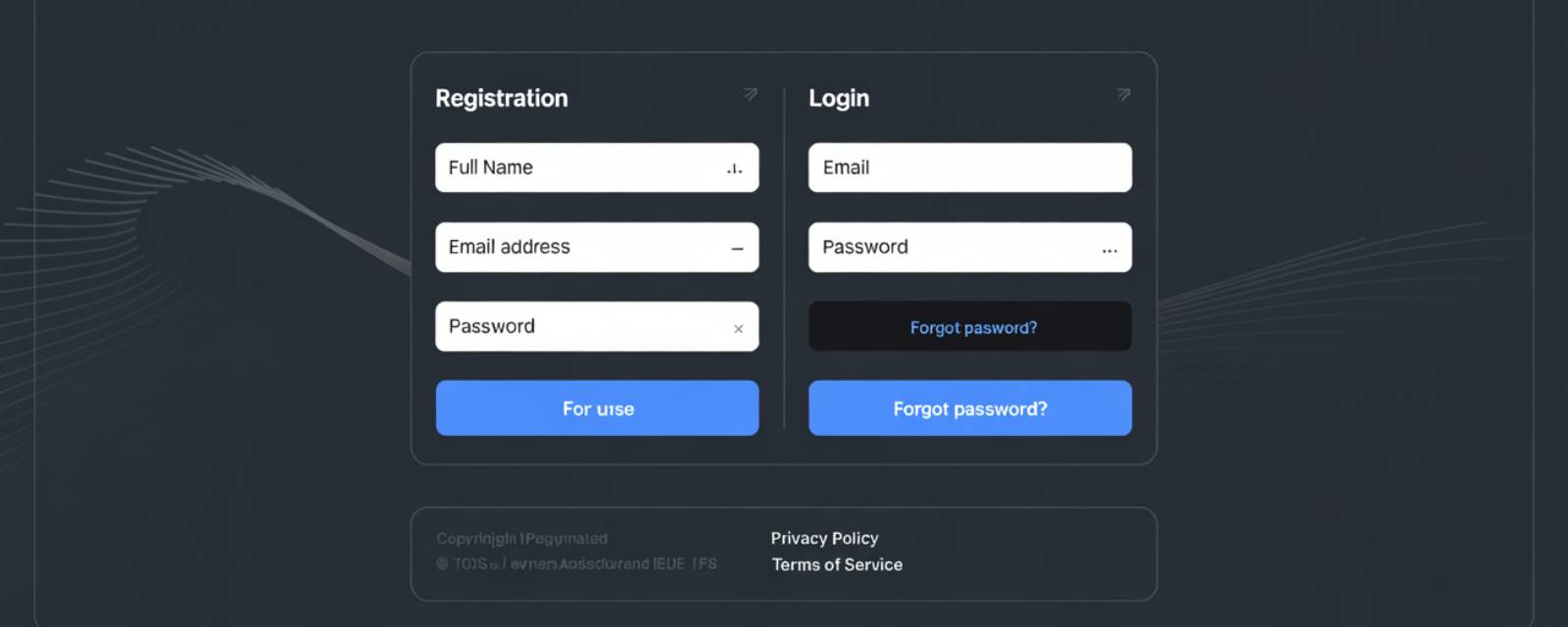Here in this blog, we will be guiding you through how to build a contemporary login and registration form using HTML and CSS. Great for beginners looking to learn about form design or developers seeking a clean, responsive template.
1. Project Setup
First, create a new folder for your project with two files:
-
index.html(for HTML structure) -
style.css(for styling)
<!DOCTYPE html>
<html lang="en">
<head>
<meta charset="UTF-8">
<meta name="viewport" content="width=device-width, initial-scale=1.0">
<title>Login & Registration Form</title>
<link rel="stylesheet" href="style.css">
</head>
<body>
<!-- We'll add forms here -->
</body>
</html>
2. HTML Structure (Login & Registration Forms)
We'll create a container that holds both forms and allows switching between them.
Login Form
<div class="container">
<div class="form-container">
<!-- Login Form -->
<form class="login-form">
<h2>Login</h2>
<div class="input-group">
<input type="email" placeholder="Email" required>
</div>
<div class="input-group">
<input type="password" placeholder="Password" required>
</div>
<button type="submit">Login</button>
<p class="toggle-form">Don't have an account? <a href="#" id="show-register">Register</a></p>
</form>
<!-- Registration Form -->
<form class="register-form hidden">
<h2>Register</h2>
<div class="input-group">
<input type="text" placeholder="Full Name" required>
</div>
<div class="input-group">
<input type="email" placeholder="Email" required>
</div>
<div class="input-group">
<input type="password" placeholder="Password" required>
</div>
<button type="submit">Register</button>
<p class="toggle-form">Already have an account? <a href="#" id="show-login">Login</a></p>
</form>
</div>
</div>
3. CSS Styling (Modern & Responsive)
Now, let’s style the forms with CSS Flexbox for a clean layout.
/* style.css */
* {
margin: 0;
padding: 0;
box-sizing: border-box;
font-family: 'Arial', sans-serif;
}
body {
background: #f5f5f5;
display: flex;
justify-content: center;
align-items: center;
min-height: 100vh;
}
.container {
width: 100%;
max-width: 400px;
background: #fff;
border-radius: 10px;
box-shadow: 0 0 20px rgba(0, 0, 0, 0.1);
padding: 30px;
}
.form-container {
position: relative;
width: 100%;
}
.login-form, .register-form {
transition: all 0.3s ease;
}
.hidden {
display: none;
}
h2 {
text-align: center;
margin-bottom: 20px;
color: #333;
}
.input-group {
margin-bottom: 15px;
}
input {
width: 100%;
padding: 12px;
border: 1px solid #ddd;
border-radius: 5px;
outline: none;
transition: border 0.3s;
}
input:focus {
border-color: #eb5c17;
}
button {
width: 100%;
padding: 12px;
background: #eb5c17;
color: white;
border: none;
border-radius: 5px;
cursor: pointer;
font-weight: bold;
transition: background 0.3s;
}
button:hover {
background: #d35400;
}
.toggle-form {
text-align: center;
margin-top: 15px;
color: #666;
}
.toggle-form a {
color: #eb5c17;
text-decoration: none;
font-weight: bold;
}
.toggle-form a:hover {
text-decoration: underline;
}
4. Toggle Between Login & Register Forms
We'll use JavaScript to switch between forms when clicking "Register" or "Login."
<script>
document.getElementById("show-register").addEventListener("click", function(e) {
e.preventDefault();
document.querySelector(".login-form").classList.add("hidden");
document.querySelector(".register-form").classList.remove("hidden");
});
document.getElementById("show-login").addEventListener("click", function(e) {
e.preventDefault();
document.querySelector(".register-form").classList.add("hidden");
document.querySelector(".login-form").classList.remove("hidden");
});
</script>




Login to leave a comment.